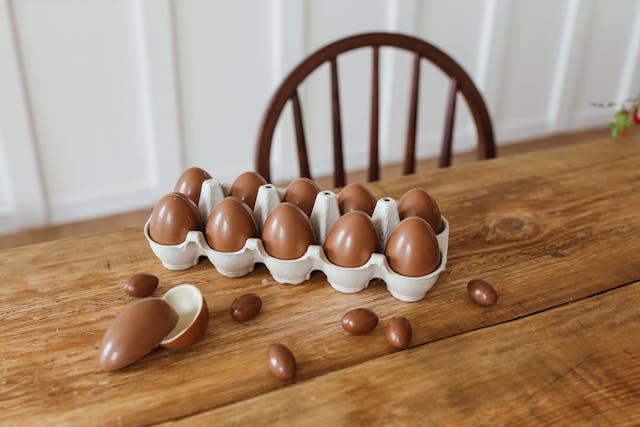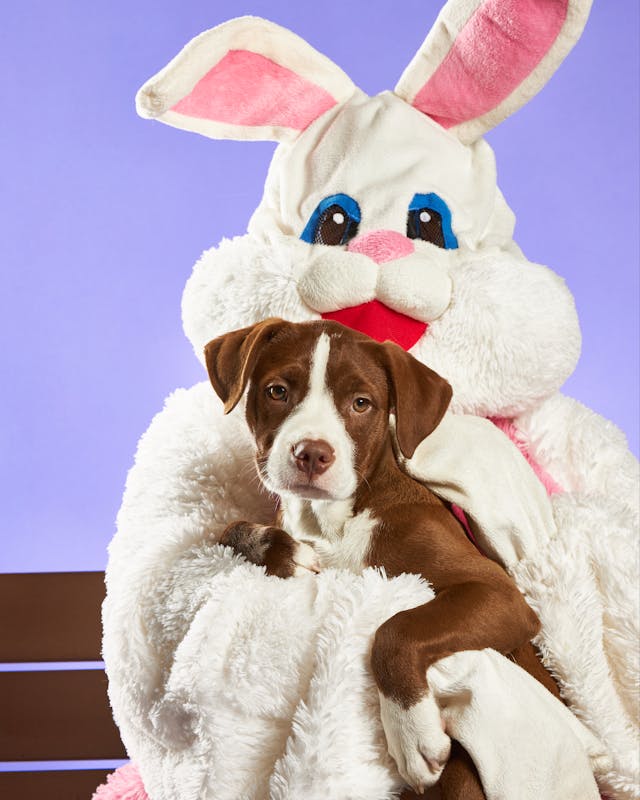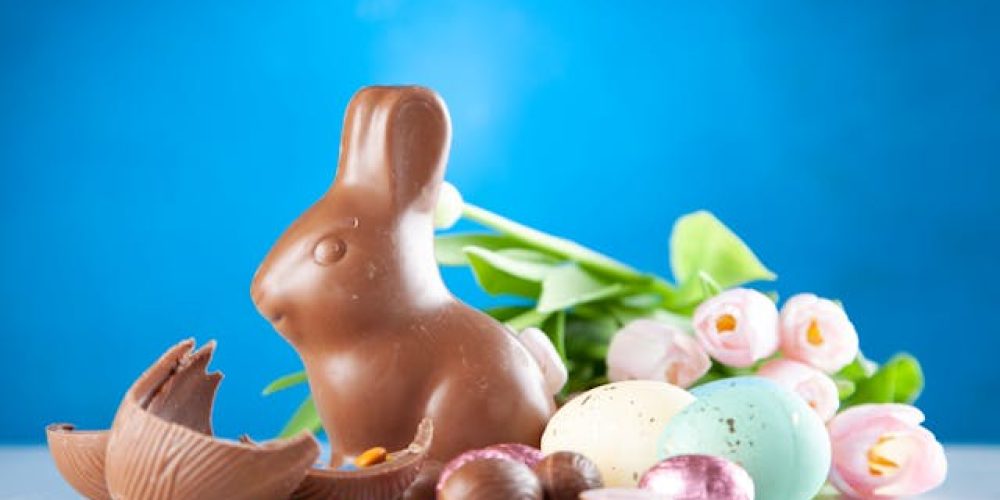Easter is a wonderful time of lighter spring evenings, lambs in fields and Easter eggs in shopping baskets! But some of the things we enjoy most at Easter are harmful to pets. They can even cause life-threatening illnesses. This article looks at 4 common dangers and hazards for pets at Easter, what to look out for, why they’re harmful and what to do in an emergency.
Easter dangers for pets – food
Easter eggs

Over 80 million Easter eggs are sold in the UK every year. That’s a lot of chocolate in households all across the country. The chances are that some enterprising pooches will find their way through the packaging to the dangerous delights concealed within. Dangerous because chocolate is very harmful for dogs and cats.
(Though cats usually – and very wisely – avoid sweet things)
- Chocolate contains theobromine, which is poisonous to dogs.
- Dark chocolate is the biggest risk: the stronger the dark chocolate, the more theobromine it contains.
- Symptoms include vomiting, diarrhoea, drooling, drinking more, restlessness, and panting. Tremors, seizures and heart problems can occur with severe poisoning.
- White chocolate contains much less theobromine, but a lot of fat and sugar. It can trigger vomiting and diarrhoea, even pancreatitis.
- Severity: mild to life-threatening, depending on the amount and type of chocolate a dog eats.
Other sweets
Don’t like chocolate? Watching the calories? You may opt for low-sugar versions of classic Easter treats. But be careful to check for xylitol in the ingredients.
Xylitol poisoning
- A popular sugar substitute for humans. But very poisonous to dogs.
- Causes a sudden and dangerous drop in blood sugar levels, like a massive insulin overdose.
- Symptoms include vomiting, weakness, tremors, sleepiness, seizures and coma.
- Severity: potentially life-threatening.
Hot cross buns

We’ll eat 20 million packs of these wonderful Easter buns every year – a traditional spiced fruity bun that’s popular at this time of year. And strictly for humans. Because Hot Cross Buns contain raisins, a serious Easter danger for pets!
- Raisins and grapes are extremely poisonous to pets.
- On their own or in cakes, biscuits and puddings, raisins can cause sudden kidney failure and death.
- Symptoms begin within 6-12 hours after ingestion and include vomiting and diarrhoea, going off food, tummy pain and weakness, drinking more, dehydration and shivering
- Severity: life-threatening to animals who can’t tolerate raisins.
- We don’t really know why they’re so harmful. But eating a single raisin can result in life-threatening illness for dogs and cats.
Inspired by Bake-Off? Tempted to make your own Hot Cross Buns? Be careful not to leave the rising dough unattended around counter-surfing, snack-hungry pets.
Uncooked dough is poisonous to pets for 2 reasons:
- The dough continues to expand inside their tummy causing severe tummy upsets and bloat.
- Yeast and sugar in the raw dough ferment inside the stomach. This produces alcohol, which is also very poisonous to dogs.
- Symptoms include bloating, panting, retching, vomiting, disorientation, sleepiness, low body temperature, drinking more, shivering, and seizures.
- Severity: potentially life-threatening.
Nuts
Some Easter traditions include exchanging nuts with family and friends. Some nuts, such as peanuts, hazelnuts, almonds and roasted cashews, may be ok for pets in small amounts. But the Easter dangers with all nuts include:
- Tummy upsets due to high fat content.
- Intestinal blockages due to the size and shape of whole nuts (and dogs are not the best at chewing things first!)
- Symptoms include diarrhoea, vomiting, tummy pain, going off food, and becoming lethargic.
- Small dogs run the risk of accidentally inhaling dry nuts into their windpipe resulting in gagging, retching or even a dangerous chest infection.
- Severity: depends on the amount eaten, size of pet and type of nut.
Some nuts are poisonous to dogs and so best avoided completely, such as Macadamia nuts, walnuts, raw cashews.
What to do if your dog eats an Easter food danger
Call your nearest vet without delay if your dog eats chocolate, raisins, raw dough or poisonous nuts. Even if you are unsure how much.
Vets can:
- Give your dog an injection to empty their tummy. The injection needs to be given as soon as possible after your pet eats something hazardous. Ideally within 1-2 hours.
- Prescribe medicine to prevent or treat the symptoms or likely symptoms of poisoning.
Chocolate risks depend on how much chocolate your pet eats, their weight and how dark the chocolate is (cocoa %). Your vet can help you evaluate the risk.
Experienced Joii vets are on hand for advice 24/7. Download the app and call us now.
Safe Easter treats for pets
Everyone deserves an Easter treat, so why not include your furry family members with some safe and tasty homemade treats this Easter?
Dogs will love the peanut butter, yoghurt, and carrots and more in these recipes from the Kennel Club.
And for the discerning cat, check out these tempting options for a purrfect Easter present.
Easter dangers for pets – plants and flowers

Cut flowers and flowering plants bring spring sunshine into our homes at Easter. But part or all of certain plants are poisonous to pets.
Daffodils
- Cut flowers or plants.
- Bulbs are most toxic, flowers and leaves are mildly irritant.
- Symptoms of poisoning include vomiting, diarrhoea, tummy pain. Possibly worsening to slow heart rate and seizures.
- Severity: can be life-threatening.
Hyacinths and tulips
- Bulbs are harmful if eaten.
- Symptoms of poisoning: quick onset drooling, vomiting, diarrhoea, tummy pain.
- Severity: mild to moderate.
- Action: call a vet as soon as possible.
- Eating hyacinths also risks intestinal foreign body (blockage).
Easter Lilies

- True lilies, including Easter lilies, Stargazer lilies, Tiger Lilies and Daylilies.
- Beautiful garden flowers and cut flowers in floral arrangements.
- All parts are poisonous to pets if they eat them. Cats can swallow pollen when they groom their coats without directly eating the plant.
- Symptoms of poisoning include nausea, drooling, vomiting, lethargy, and not eating.
- Symptoms of kidney failure in cats: increased thirst, peeing more and becoming dehydrated.
- Severity: life-threatening for cats. Moderate mouth and tummy upset for dogs.
Amaryllis, rhododendrons and azaleas can also cause problems in pets. Find out more information on dangerous plants for cats and dogs in our spring hazards and poisonous plants articles.
What to do if your pet eats poisonous Easter plants or bulbs
- Remove your pet from further risk.
- Call a vet as soon as possible.
- Rinse your pet’s mouth with cold, clean water if they’re drooling, pawing or showing signs of an irritated mouth.
Easter dangers for pets – foreign bodies

If your pooch is a champion chewer of everything they shouldn’t, take extra care with:
- Filled plastic eggs for Easter egg hunts.
- Fluffy toy chicks or cuddly Easter bunnies.
- Easter egg packaging.
- Coloured string used to fill Easter baskets and the baskets themselves!
- Symptoms of trouble include vomiting, diarrhoea, not eating, and lethargy.
- Severity: severe to life-threatening intestinal obstruction, depending on what the object is, where it’s stuck and how quickly it’s identified.
What to do if your pet eats an Easter foreign body
Call a vet immediately if your pet eats anything that might get stuck in their tummy.
Vets can:
- Give your dog an injection to empty their tummy.
- Remove small foreign bodies from the stomach with a special camera.
- If symptoms develop, check for obstructions with x-rays or ultrasound.
- Carry out an emergency operation to remove a life-threatening blockage.
Easter dangers for pets – visitors and travel
Easter can be the perfect time for seeing family and friends or for a spring getaway. Over 6 million of us will take a UK break and 4 million head abroad. But pets may not share our enthusiasm for these Easter traditions.
Visitors and stress
- Some pets, especially cats, don’t respond well to changes in routine.
- Symptoms of stress in cats include going off food, becoming withdrawn, using the litter tray more often, struggling to pee, and escaping/not coming home.
- Symptoms in dogs include becoming withdrawn or more reactive, attention-seeking clingy, and, becoming destructive.
- Severity: distressing for all concerned. Risks of serious blocked bladder disorder in cats.
Travel and stress
Car journeys, catteries and kennels can all bring challenges for our furry family at Easter.
- Symptoms of travel and holiday stress: travel sickness, separation anxiety, destructive behaviour, vocalising, weight loss and tummy upsets.
- Severity: can make car journeys nightmarish for everyone. Potentially serious health risks and dangers with pets.
How to manage Easter visitor and travel dangers
However you plan to celebrate Easter this year, it pays to plan ahead for your pets:

Expecting visitors?
- Use calming diffusers and supplements to help your pet feel safe and secure.
- Provide a quiet area for them to escape to, away from young children and visiting pets.
- Talk to a vet for advice. The friendly Joii vets are on hand 24/7 for tips to prevent and reduce stress in pets.
Transport hazards and travel sickness?
Minimising stress with practical measures:
- Plan travel routes carefully to allow for regular comfort breaks for all the family.
- Allow for delays: take enough food and water. With around 17 million car trips over the Easter weekend, delays are inevitable!
- Ensure your pet is safe, secure and comfortable, ideally in their own carrier or crate for travel.
Treating travel sickness:
- Build up car or public transport journeys gradually
- Provide familiar toys or blankets
- Supplements or prescription medicines for travel sickness
Minimising cattery and kennel-related hazards?
- Plan ahead to find the right accommodation for your pet while you’re away.
- Make sure cats and dogs are up to date with preventive treatments: vaccinations, worming and flea treatments.
- Consider alternative care arrangements for older, sick or nervous pets when you’re away. Perhaps having family or pet sitters stay over and allowing your pet to stay safe at home.
Call our Joii Vets 24/7 for advice on managing travel and travel sickness in pets.
Understanding Easter hazards for pets and how to avoid them ensures the whole family can relax and celebrate. And prevents the worry and expense of harm to pets from common Easter hazards.
Download the Joii app now for peace of mind with pets this Easter. And have a Happy Easter everyone!












